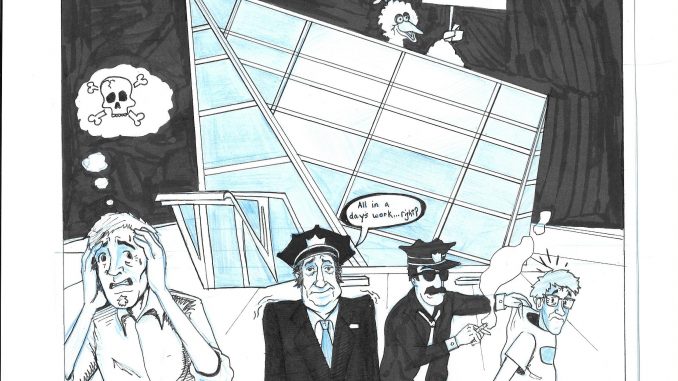
Today is April 20, commonly known as “4/20,” a date with significant meaning in cannabis culture. To commemorate this landmark date, we found it appropriate to comment on the situation surrounding marijuana on campus and across the nation.
In addition to the District of Columbia, eight states have legalized the recreational use of marijuana, with 21 states having decriminalized possession of marijuana. Last November, we wrote an editorial supporting efforts to legalize recreational marijuana in New York State. Now, we call on the administration, the highly-regarded leaders of our campus community, to embrace a more compassionate approach to marijuana policy.
Currently, SUNY New Paltz’s policy for a student’s first marijuana-related offense is no less than disciplinary probation and educational intervention, but not more than expulsion. However, penalties for a student’s second offense are listed as no less than expulsion. Of all 64 colleges in the SUNY system, SUNY New Paltz remains the only one with a strict two-strike policy on marijuana.
We at The New Paltz Oracle urge the administration to modernize our campus’ policies towards marijuana and institute the three-strike policy found on most other SUNY campuses. To be clear, we are not asking SUNY New Paltz to tacitly approve of students’ illegal drug use. Instead, we only ask for the campus administration to implement common sense drug policies that would give students more support in pursuit of their college degrees. We see the current two-strike policy as one that goes far beyond prohibition, instead effectively serving as a hefty punitive measure for a relatively minor offense.
In the SUNY New Paltz Student Handbook, there are two crimes that result in a penalty defined as no less than expulsion: the second offense for possession of marijuana and rape. Severe crimes like sexual assault, domestic violence, sexual harassment and even possession of illegal weapons hold for “disciplinary probation, suspension (held in abeyance), suspension or expulsion,” but do not mandate it. We find this to be a striking inconsistency in how crimes are measured and addressed on campus.
Compared to other SUNYs, New Paltz almost seems puritanical in its policing of marijuana. SUNY Cortland and SUNY Oswego both have a three-strike policy which mentions potential suspensions but never expulsion. At SUNY Geneseo, which technically has a two-strike policy, after a second offense a student must meet with an evaluator before the student conduct board, which then “decides what the following sanction will be.” Once again, expulsion is never explicitly listed as a penalty.
For background, until 1997, expulsion was the immediate consequence for smoking on campus at SUNY New Paltz. Clearly, the College has shown its ability to modernize and adapt to cultural shifts and we encourage them to take the same steps as New York State. In 1977, after enduring some of the harshest penalties in the nation, the Rockefeller Drug Laws, New York State gradually began to decriminalize its laws regarding possession of marijuana.
Currently, a first offense for possession of up to 25 grams of marijuana results in a maximum fine of $100. For a second offense, it is a $200 fine and for a third offense, it is a $250 fine and a maximum of 15 days in jail. In essence, SUNY New Paltz differentiates itself not only from other SUNYs but also from New York State, which basically has its own three-strike policy.
According to a recent study by the National Survey on Drug Use and Health, 23 percent of people aged 18-25 in New York State have used marijuana in the last month and 36 percent in the last year. It may just be conjecture, but we do not find it a great leap to assume that this number would be even higher on college campuses like ours, where a sizable portion of students may be smoking marijuana or even using it for medicinal purposes.
That being said, the campus’ policy should acknowledge that reality with flexibility. Even if the number of expulsions due to the two-strike policy are low, offering at least one more strike will allow for another barrier between a student’s mistake and the harshest penalty this institution has available. It’s been proven that if a person has a serious drug problem, punitive measures like kicking a student out have rarely been found to help compared to assisting them through rehabilitatory means.
Additionally, some students may not even factor into those low expulsion statistics, opting to drop out rather than have an expulsion permanently stamped on their academic transcript. We argue that students are under enough pressure to succeed academically without the threat of expulsion for getting caught with a dimebag twice.
This current two-strike policy is a continuation of the failed decades-long “War on Drugs,” demonstrating a clear misapplication of our UPD’s time and priorities. A more compassionate approach to marijuana would allow UPD to devote more time towards serious breaches of student safety that demand their attention, like sexual assault. We believe that our UPD officers, as well as the campus community, would be better served by addressing more pressing matters than students smoking on the Tripping Fields.
